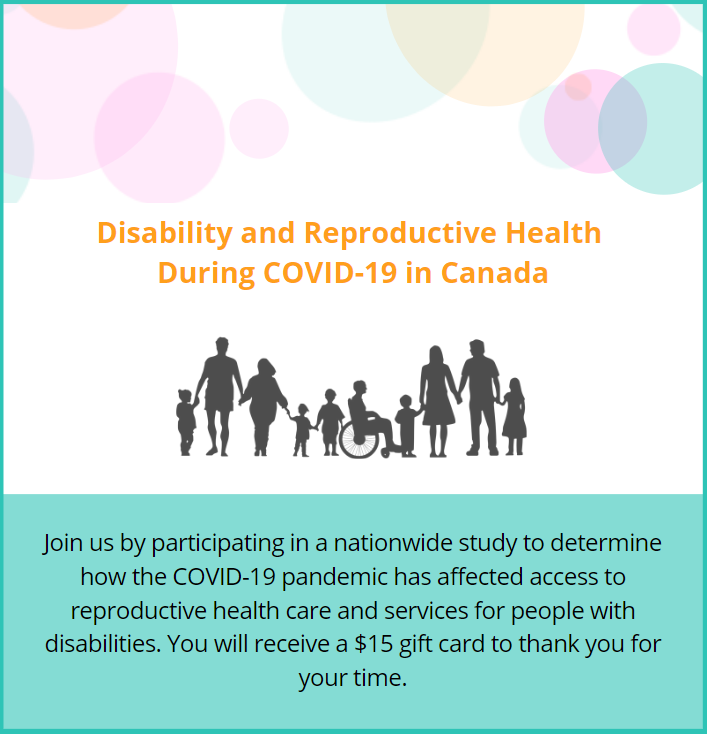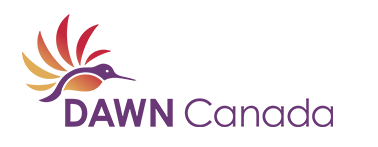Disability & Reproductive Health During the COVID-19 Pandemic

Disability & Reproductive Health During the COVID-19 Pandemic
DAWN Canada has partnered with researchers at the University of Toronto to examine the experiences of those with disabilities accessing reproductive health during the COVID-19 pandemic. According to the World Health Organization (WHO) reproductive health includes the physical, mental and social well-being of a person related to a persons’ right to have satisfying sexual relationships and the freedom to decide when and how frequently they do this and if they want to have children.
Why Reproductive Health Matters
Many communities, including those who are Deaf or have disabilities face significant barriers in accessing reproductive healthcare. Historically those with disabilities were not recognized as having reproductive rights and were often sterilized against their will (a part of Canada’s long and ongoing history of eugenics). Additionally, there are barriers within health care that still limit access to reproductive rights, including inaccessible equipment/facilities and a lack of knowledge about disability from health care providers.1 As a result of these barriers, Deaf women and women with disabilities still remain more prone to coercion (including with abortion), and loss of custody.2 Complicating this are barriers to sexual education for many which is an important foundation to understanding one’s reproductive rights. For example, despite sex education being mandatory for many high school students in Canadian provinces, young people still demonstrate serious gaps in knowledge including poor understanding of contraceptives, sexual assault, HIV, and reproductive physiology.3 Additionally, there are a lack of Canadian studies that examine understanding around sexual consent, and while curriculum may include learning about ‘responsible’ relationships, in Ontario at least, youth demonstrate a poor understanding of the law and consent despite completing their sex education requirements.4 These barriers are all more prevalent for people with disabilities who are also Indigenous, LGBTQ2S+, new Canadians, unhoused populations, racialized etc.
How You Can Participate in This Research
You may be eligible to participate in this research if you:
● Identify or may be identified as having a disability;
● Identify as a woman, trans, or non-binary person;
● Are 18 years or older;
● Live and receive health care in Canada
Eligible participants have the option of completing a 20-minute survey and/or a 1-hour interview about their reproductive health and the health care services received since the beginning of the COVID-19 pandemic.
The survey can be completed online, by telephone, or by Zoom with a researcher at a time that works for participants. The interview can also be completed by telephone and Zoom and eligible participants can complete both the survey and interview if they would like.
Support and accommodation will be provided for participants.
Participants will receive a $15 gift card for the survey and a $40 gift card for the interview.
Participating in this study will have no impact on the reproductive health services you currently receive or will access in the future.
What is shared with researchers will help make services better for other people during and beyond the pandemic.
To learn more or to participate researchers can be reached the following ways:
By email:
wiresearch.utsc@utoronto.ca
By Phone: 647-601-4519
For more information please visit:
www.utsc.utoronto.ca/projects/disabilitySRH
1 Becker, H., Stuifbergen, A., & Tinkle, M. (1997). Reproductive health care experiences of women with physical disabilities: a qualitative study. Archives of physical medicine and rehabilitation, 78(12), S26-S33.
2 Kallianes, V., & Rubenfeld, P. (1997). Disabled women and reproductive rights. Disability & Society, 12(2), 203-222.
3 Kumar, M. M., Lim, R., Langford, C., Seabrook, J. A., Speechley, K. N., & Lynch, T. (2013). Sexual knowledge of Canadian adolescents after completion of high school sexual education requirements. Paediatrics & child health, 18(2), 74-80.
4 Kumar, M. M., Lim, R., Langford, C., Seabrook, J. A., Speechley, K. N., & Lynch, T. (2013). Sexual knowledge of Canadian adolescents after completion of high school sexual education requirements. Paediatrics & child health, 18(2), 74-80.
